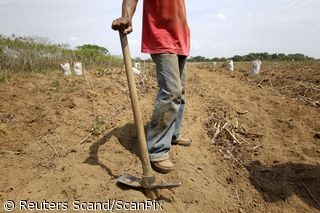Unemployment in Eastern European nations that will join the European Union in May, including Poland, Slovakia and the Czech Republic, may rise from their current near-record levels
Published:
2 November 2003 y., Sunday
Unemployment in Eastern European nations that will join the European Union in May, including Poland, Slovakia and the Czech Republic, may rise from their current near-record levels as companies struggle to compete.
Job cuts ``are crucial to reducing costs and lowering our coal prices so we can compete after joining the EU,'' said Maksymilian Klank, president of Poland's state-owned Kompania Weglowa SA, Europe's largest coal mining company by production, at a Warsaw press conference last week.
The Polish and Slovak second-quarter jobless rates of 20 percent and 17 percent were more than double the EU average of 8 percent, based on figures compiled by Eurostat. The Czech Labor Ministry will probably report today that unemployment was unchanged at 10 percent in September, according to 13 economists surveyed by Bloomberg News.
Voters in the 10 mainly Eastern European countries that are joining the EU were promised that unemployment would fall as companies gain access to new customers and older members open borders to the East. With accession seven months away, governments and many businesses say they expect to trim workforces to survive in an enlarged trading region of 450 million people.
Unemployment has risen in the future EU countries even as growth in the entrants' combined $487 billion economy has outpaced the EU this year.
Average growth in Poland, the Czech Republic, Hungary and Slovakia, the largest of the 10 entrants, totaled an annual 3 percent in the second quarter. By contrast, France and Germany, two of the three largest EU countries, fell into recession.
Šaltinis:
Bloomberg
Copying, publishing, announcing any information from the News.lt portal without written permission of News.lt editorial office is prohibited.
The most popular articles
 EU animal welfare rules must be more rigorously enforced, with more inspections and effective penalties, said the Agriculture Committee on Wednesday.
more »
EU animal welfare rules must be more rigorously enforced, with more inspections and effective penalties, said the Agriculture Committee on Wednesday.
more »
 Fifty-three year old Rasima collects dirt everyday from a paddy field in Indonesia’s east Java province, turning it into a snack made entirely from soil, called "ampo."
more »
Fifty-three year old Rasima collects dirt everyday from a paddy field in Indonesia’s east Java province, turning it into a snack made entirely from soil, called "ampo."
more »
 At the moment an Argentinian working for a French company in Spain can't travel to France for a meeting on his long-term visa.
more »
At the moment an Argentinian working for a French company in Spain can't travel to France for a meeting on his long-term visa.
more »
 An EU-wide strategy is needed to combat violence against women, which must be recognised as a crime, said participants in a European Parliament public hearing with national parliaments and civil society representatives, held on Tuesday to mark International Women's Day.
more »
An EU-wide strategy is needed to combat violence against women, which must be recognised as a crime, said participants in a European Parliament public hearing with national parliaments and civil society representatives, held on Tuesday to mark International Women's Day.
more »
 You know its Tet in Vietnam when Peach and Kumquat orange trees decorate every home, shop and public establishment.
more »
You know its Tet in Vietnam when Peach and Kumquat orange trees decorate every home, shop and public establishment.
more »
 A surveyor has set up his tripod and instruments under a hot tropical sun to measure plots of land in a village where the Dac Kray minority community were settled four years ago.
more »
A surveyor has set up his tripod and instruments under a hot tropical sun to measure plots of land in a village where the Dac Kray minority community were settled four years ago.
more »
 Japanese men are answering the call of Valentine s Day a month late.
more »
Japanese men are answering the call of Valentine s Day a month late.
more »
 In three urgent resolutions adopted on Thursday, Parliament urges Hamas to release kidnapped Israeli soldier Gilad Shalit, deplores the escalating criminal violence in Mexico and calls on South Korea to scrap the death penalty.
more »
In three urgent resolutions adopted on Thursday, Parliament urges Hamas to release kidnapped Israeli soldier Gilad Shalit, deplores the escalating criminal violence in Mexico and calls on South Korea to scrap the death penalty.
more »
 The plight of Europe's 10 million Roma population will fall under the spotlight Tuesday afternoon when MEPs discuss an upcoming Roman summit.
more »
The plight of Europe's 10 million Roma population will fall under the spotlight Tuesday afternoon when MEPs discuss an upcoming Roman summit.
more »
 EU Employment and Social Affairs Ministers have today adopted a Directive to prevent injuries and infections to healthcare workers from sharp objects such as needle sticks – one of the most serious health and safety threats in European workplaces and estimated to cause 1 million injuries each year.
more »
EU Employment and Social Affairs Ministers have today adopted a Directive to prevent injuries and infections to healthcare workers from sharp objects such as needle sticks – one of the most serious health and safety threats in European workplaces and estimated to cause 1 million injuries each year.
more »